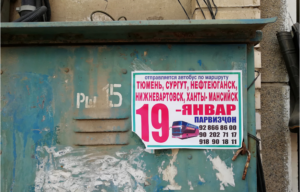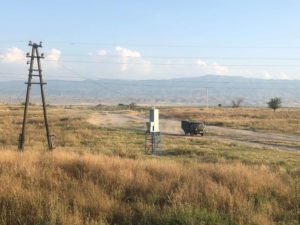Despite going up in the rankings, Tajikistan’s internet is still among the slowest in the world, lagging behind its Central Asian neighbours.
This article was originally published on Novastan’s French website.
Internet users in Tajikistan have been complaining about slow Internet for years. Hence their surprise upon learning that their country had gone up six places in the American company Ookla’s Internet speed rankings. Each month, Ookla publishes an index of mobile and fixed broadband Internet speeds known as the Speedtest Global Index.
Despite this improvement, Tajikistan is only 127th out of 138 for mobile network connections. It lags behind other countries in Central Asia: Kazakhstan, Kyrgyzstan and Uzbekistan are respectively in 101st, 103rd and 125th position for mobile connections in September 2020.
Want more Central Asia in your inbox? Subscribe to our newsletter here.
Measuring mobile network rather than broadband speeds is more relevant here because of the high number of mobile users, particularly in isolated mountainous areas, as explained by the Russian media Sputnik. Tajikistan has nevertheless gone from 109th to 90th place in fixed broadband in the same period, overtaking Uzbekistan (96th) and Turkmenistan (196th, in last place).
The improvement reported by Ookla is all relative when Tajik users still must wait until late at night to use basic messaging services such as Signal, Viber or Whatsapp, Eurasianet notes. This follows the creation of a state-run agency with a monopoly on data traffic. As the American Russian-language TV channel Current Time describes, since 2016 all Internet service providers (ISPs) must purchase and forward their data through the Unified Electronic Communications Switching Center, which is under the authority of the State Telecommunications Service.
A centralised system since 2016
The idea of creating an agency such as the Unified Electronic Communications Switching Center (EKTs, after its Russian-language acronym) dates back to 2006. Apparently under pressure from government agencies in charge of telecommunications, the Tajik government decided to bring the liberalisation of this increasingly lucrative market to an end. Tojiktelecom, one of the country’s nine operators, was then chosen to build the centre.
The project did not see the light of day until 2016 when President Emomali Rahmon signed the decree “on the Unified Electronic Communications Switching Center”. Since then, ISPs must buy the Internet traffic they distribute to consumers from the EKTs. Service providers are therefore cut off from their own connections to the global network, leading to worse connectivity: according to the International Telecommunications Union (ITU), the international bandwidth per user in Tajikistan in 2017 was 2.2 kilobit per second (kbits/s) against 66.8 kbits/s in the Commonwealth of Independent States (CIS).
Soaring costs for users
The creation of the EKTs has also had a lasting impact on the price of digital services in Tajikistan. As reported by Sputnik, every gigabit now costs $50,000 (£38,000) to ISPs, against $10,000-20,000 (£7,500-15,000) in neighbouring countries. This cost is a result of a sudden 10% increase in subscription prices for individuals and businesses. On top of that, there is a 5% excise duty on communications and a fee of 0.8 somoni (£0.05) per month to use a SIM card.
Telecommunications in Tajikistan have thus gone from being an important driver of the country’s economic growth to one of the most expensive industries in Asia. According to the British company Existent, 1GB of mobile data costs on average $4.65 (£3.50). In Kyrgyzstan, a country in a similar geographical position, the average price is $0.10 (£0.07). Between 2013 and 2019, incomes in this sector in Tajikistan have decreased from 540 million to 275 million US dollars, according to Tajik media Asia-Plus.
Local testimonies show this could in fact be part of a strategy for government agencies to take over the communications market. A Beeline insider told Eurasianet she suspected the authorities of switching off the internet and then requiring additional payments from providers to restore it. Others attribute such practices to the proximity of the director of the State Telecommunications Agency, Beg Sabur, to the president. Emomali Rahmon’s daughter is married to Beg Sabur’s son.
Since 2016, several international ISPs have decided to leave Tajikistan, including Beeline’s subsidiary.
An open door to censorship?
As an obligatory passage for all connections outside Tajikistan, the EKTs is able to apply mass surveillance, but also block any content or user identified as a threat by the country’s security services.
Still according to Eurasianet, the government is behind the blocking of independent news sources in Tajikistan such as Radio Ozodi, the Tajik branch of the American media RFE/RL, and Asia Plus. It could also be responsible for local or national blackouts. For example, in 2018 the internet in the Gorno Badakhshan autonomous region was cut off for over a week during local protests. Last September, in the run up to the 11 October presidential election, platforms such as YouTube, Facebook and Twitter were offline during the live broadcast of the opposition politician Muhiddin Kabiri, Current Time reports.
By acting as a bottleneck, the EKTs is a cheaper alternative to the SORM systems in place in many post-Soviet countries. All Russian internet and telephone service providers are now equipped with these boxes, giving the authorities direct access to users’ data. Belarus is the only other post-Soviet country to use a system like Tajikistan’s.
As Current Time notes, this system could lead to severe security issues for Tajikistan. In case of cyberattack against the EKTs, the attackers could theoretically intercept all communications going through the centre, and even take down the entire country’s network. It’s an additional risk for Tajikistan’s economy, when NetBlocks estimates the total cost of an hour-long shutdown at 820 867 somoni (£54,500). That being said, as the Russian media Meduza notes about Belarus’s similar system, shutting down Internet access externally is very difficult even when communications are so centralised.
The long road to diversification
Telecommunications are, then, high-stakes in Tajikistan, which already experienced higher prices in the Soviet era because of its geographical position. The Tajik internet now has four fibre exit points to the rest of the world. Most in use are the ones linking the capital, Dushanbe, to the Eurasian internet backbones through Russia, transiting via Kyrgyzstan or Uzbekistan before crossing Kazakhstan. Tajikistan also set up a link with Afghanistan in 2009, during the American intervention, and more recently with the Xinjiang region in China.

Several projects are being examined to allow Tajikistan to regain its status of crossroads between the post-Soviet space, the Middle East, Southeast Asia and the Far East. The Digital CASA (Central Asia South Asia) project, for example, has been planning to set up fibre optic lines between Kyrgyzstan, Tajikistan, Afghanistan and Pakistan since 2016. The initiative hopes to consolidate the digital sector in the four countries and accelerate the development of online services, whether public or private. However, the cost of installing infrastructure, the recurring conflicts in the cable routing regions, and the Covid-19 crisis have temporarily put a halt to the negotiations.
Restoring the telecommunications sector represents a long-term investment for Tajikistan. Beyond mere economic development, it means letting people enjoy the opportunities created by a decentralised network based on a plurality of interconnected nodes. The benefits look numerous and within reach, from public services in remote areas to education and health during a pandemic. To do this, however, the Tajik government will have to thoroughly review its relationship with the various actors in the field and particularly with those who have benefited from the state’s control of the internet.
Vadim Alinov
Translated by Valentine Baldassari
 In Tajikistan, government control still slows down internet
In Tajikistan, government control still slows down internet 



